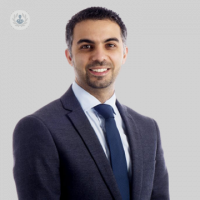A detailed explanation of thulium laser resection: part 1
Written by:In the first article of a two-part series, renowned consultant urological surgeon Mr Ahmed Ali, one of the few doctors in the country to perform thulium laser resection, a new innovative approach for bladder tumours, provides a detailed explanation of the approach, including the steps involved in the procedure and who is an ideal candidate for the procedure.

What does the thulium laser resection procedure for bladder tumours consist of?
In my practice, we started using thulium laser as a method to resect bladder tumours en bloc. The main idea came from the characteristics of the thulium laser. It provides very precise pinpoint energy that can help to resect the mucosa of the tumour with strong hemostatic power. It reduces the morbidity and risk of bladder perforation due to its precise forward movement of the resection rather than the old electricity bipolar or monopolar resection.
What are the key steps involved and how does the use of thulium laser technology enhance precision and safety during the process?
There are multiple preparing steps for the use of thulium laser technology. We must look at the CT scan and the appearance of the tumour during a cystoscopy when doing the initial assessment of the bladder tumour. We generally use this for papillary tumours, but recently with increasing knowledge and practice, we are now able to do sessile tumours with a broad base. However, the most limiting factor is the size of the tumour, therefore, we always ensure that the tumour is not very large.
The tumour should be under 3 centimetres and the location of the tumour within the bladder is important. Having said that, with our improving learning curve, we feel we could treat any location within the bladder.
The thulium laser, as previously mentioned, has a very safe profile in terms of coagulation. Its penetration within the tissue of the bladder is limited; it penetrates about 0.3 to 0.5 centimetres. It is therefore very safe to use and reduces the risk of bleeding and the risk of perforation (the two most important elements in any cancer treatment).
What patient factors of tumour characteristics would make thulium laser resection particularly suitable? Are there any cases where alternative approaches might be preferred?
The standard approach we use is diathermy resection, which utilises electricity to create energy through using a hot loop, either with monopolar or bipolar electricity systems. The use of energy has drawbacks, therefore, as previously mentioned, the penetration depth is higher with energy.
The conduction element of the electricity sometimes creates an obturator jerk. This is a sudden movement of the pelvis and the legs due to stimulating the obturator nerve, which passes just underneath the size of the bladder. This is the most common site for bladder tumours and therefore with this sudden jerky movement, multiple bladder perforations happened in the past.
We found that the laser actually reduces this risk by large margins. We do not think this is suitable for large tumours and that's not because we are unable to resect it with the laser. The difficulty is that we don't have an extraction device to remove the tumour at the end so it defeats the purpose of removing this en bloc.
We could use the laser to resect bigger tumours four or five centimetres but the difficulty will be in removing them out. Certain positions within the bladder may be tricky and muscle-invasive bladder cancers are not suitable to be removed by the laser.
Having said that, as our learning is improving, we're finding that we could use the laser for early T2 bladder cancers where the tumour has just infiltrated the first layer of the bladder muscle, T2A and we have one or two cases that we managed to successfully resect them completely en bloc using the thulium laser.
If you would like to book a consultation with Mr Ali, do not hesitate to do so by visiting his Top Doctors profile today.


